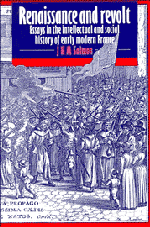Book contents
- Frontmatter
- Contents
- Acknowledgements
- Introduction
- Part I Humanism, stoicism, and interest of state
- Part II Sovereignty, resistance, and Christian obedience
- Part III Structures and fissures
- 8 Venality of office and popular sedition in seventeenth-century France
- 9 Peasant revolt in Vivarais, 1575–1580
- 10 The Paris Sixteen, 1584–1594: the social analysis of a revolutionary movement
- 11 The Audijos revolt: provincial liberties and institutional rivalries under Louis XIV
- Index
10 - The Paris Sixteen, 1584–1594: the social analysis of a revolutionary movement
Published online by Cambridge University Press: 23 December 2009
- Frontmatter
- Contents
- Acknowledgements
- Introduction
- Part I Humanism, stoicism, and interest of state
- Part II Sovereignty, resistance, and Christian obedience
- Part III Structures and fissures
- 8 Venality of office and popular sedition in seventeenth-century France
- 9 Peasant revolt in Vivarais, 1575–1580
- 10 The Paris Sixteen, 1584–1594: the social analysis of a revolutionary movement
- 11 The Audijos revolt: provincial liberties and institutional rivalries under Louis XIV
- Index
Summary
The movement known as the Sixteen occupies a special place in the series of popular uprisings that occurred in France during the later phases of the religious wars and in the seventeenth century. This is because it was truly revolutionary in the sense that it embodied conscious social antagonisms – a characteristic less easily identified in the antifiscal risings during Richelieu's régime. Studies of the later risings, undertaken by Roland Mousnier and his colleagues in response to the work of the Soviet historian Boris Porshnev, have been prefaced by salutary warnings against the anachronistic use of nineteenthcentury models of class conflict in the context of the preindustrial société des ordres. But some elements within the Sixteen were nonetheless revolutionary because they appealed to the collective social hostilities existing in their own day: indeed, Mousnier himself has argued that the movement intended to transform society into a dictatorial democracy directed by an elite of religious zealots.
The most superficial acquaintance with contemporary sixteenth-century opinion reveals an awareness of social conflict. Observers with a reputation for dispassionate judgment, such as Jacques-Auguste de Thou and Etienne Pasquier, denounced the Sixteen as the criminal dregs of society, who had usurped the authority properly exercised by their social superiors, and created anarchy.The diarist Pierre de PEstoile, whose bias against every aspect of the Catholic League is patent, concluded his account of the popular installation of a revolutionary commune in the Paris Hôtel de Ville after the barricades of May 1588 with the remark: “In the place of men of honour and repute exercising authority in the city, tradespeople [petits mercadans] were appointed and a rag-tag of Leaguer n'er-do-wells”.
- Type
- Chapter
- Information
- Renaissance and RevoltEssays in the Intellectual and Social History of Early Modern France, pp. 235 - 266Publisher: Cambridge University PressPrint publication year: 1987
- 1
- Cited by



